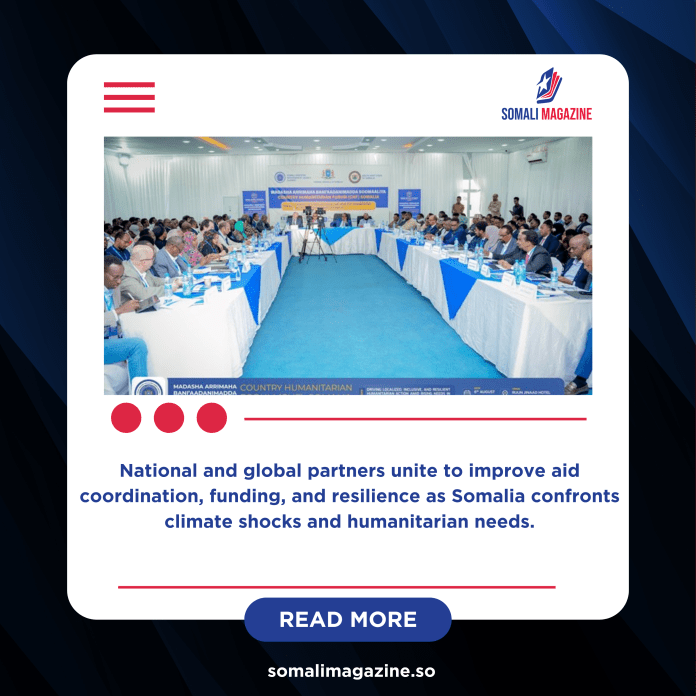Facebook Twitter (X) Instagram Somali Magazine - People's Magazine
The Somalia Humanitarian Forum 2025 (CHF 2025) officially kicked off on Tuesday in Baidoa, bringing together government leaders, humanitarian organizations, and international partners. The goal of the forum is to strengthen how Somalia responds to the country’s most urgent humanitarian needs—such as drought, displacement, and food shortages—through better coordination and planning.
Organized by the Somali Disaster Management Authority (SoDMA), the forum is a key moment for Somalia to reflect on its current humanitarian challenges and find new ways to address them more effectively. The event brings together voices from all levels of government, local communities, and international aid organizations under one roof to share ideas and create joint solutions.
The main focus of this year’s forum is improving how humanitarian aid is delivered and making sure that it reaches the people who need it most. This is especially important as Somalia continues to face the impacts of climate change, including severe droughts and floods that have forced thousands of families to flee their homes. On top of that, millions continue to struggle with hunger and lack of basic services like clean water, healthcare, and education.
Key Focus Areas
Throughout the forum, participants are discussing five major areas that are critical to improving humanitarian response in Somalia:
-
Better Coordination – One of the top goals is to improve how federal and state governments work together with humanitarian agencies. This would help reduce duplication and ensure that aid efforts are more efficient and effective.
-
Improved Funding Systems – Another major topic is how to manage and distribute humanitarian funding more effectively. Speakers highlighted the need for more predictable, timely, and transparent financial support.
-
Support for Local Leadership – The forum is also pushing for more leadership from Somali communities themselves. By putting more power into the hands of local leaders and organizations, the response to crises can become more relevant, faster, and sustainable.
-
Building Resilience – Discussions are centered around helping communities become more resilient to future disasters. This means investing in long-term solutions that reduce the need for emergency aid, such as water management systems in drought-prone areas and stronger flood protection.
-
Inclusive Decision-Making – Finally, the forum is calling for more inclusive and transparent planning. This means ensuring that all groups—including women, youth, and displaced people—have a say in how aid is planned and delivered.
National Commitment to Lead
In his opening remarks, the SoDMA Commissioner emphasized Somalia’s commitment to take ownership of its humanitarian agenda. He called on international donors and partners to align their support with national plans and priorities, rather than working in isolation.
He also stressed the importance of working together and learning from past mistakes. “We must move from short-term fixes to long-term partnerships,” he said.
What Comes Next
Over the course of the forum, participants will assess what is working and where the gaps are in Somalia’s current humanitarian response. They will also look at how accountability can be improved and how partnerships can be made stronger.
By the end of the summit, attendees are expected to present practical recommendations and joint action plans that will help shape the country’s humanitarian strategy in the coming years.
Why Baidoa?
The decision to hold the forum in Baidoa is significant. As a city that has hosted large numbers of displaced people and has experience in dealing with multiple emergencies, Baidoa represents the heart of Somalia’s humanitarian work. It also highlights the leadership of the South West State in crisis management and response.

